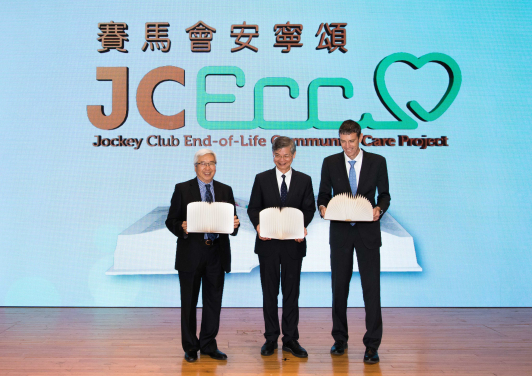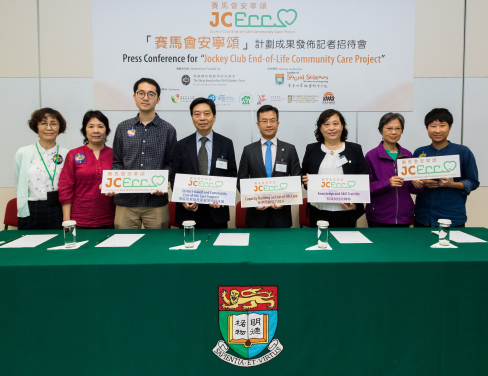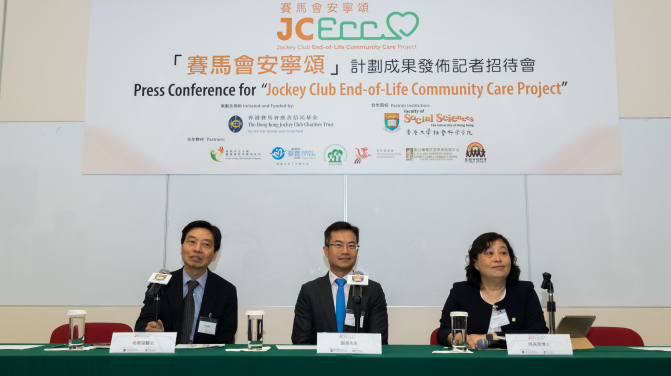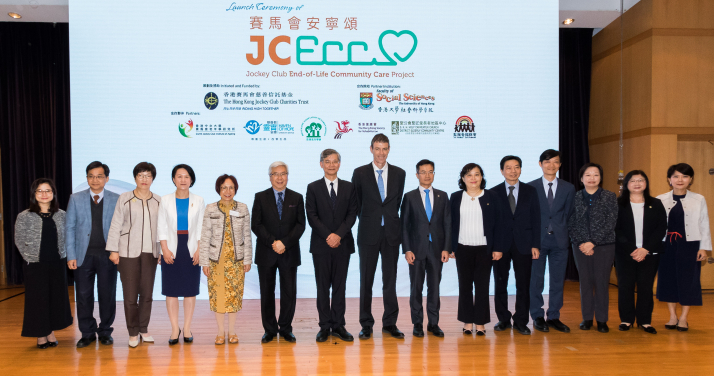Media
Jockey Club End-of-Life Community Care Project marks new milestone in Hong Kong community end-of-life care
07 May 2019

Dr. Law Chi-kwong, Secretary for Labour and Welfare, Dr. Eric Li Ka Cheung, Steward of The Hong Kong Jockey Club and Professor William Hayward, Dean of Social Sciences of HKU officiate at the Jockey Club End-of-Life Community Care Project Phase II Launch Ceremony.

Press Conference for “Jockey Club End-of-Life Community Care Project”: (From left) Ms. Cheng, representative of End-of-Life Care in Residential Care Homes for the Elderly Project of Hong Kong Association of Gerontology, Ms. Chiu, family member of service recipient, Mr. Chu, family member of service recipient, Dr. Edward Leung, President, Hong Kong Association of Gerontology; Mr. Leong Cheung, Executive Director, Charities and Community, The Hong Kong Jockey Club; Dr. Amy Chow, Associate Professor, Department of Social Work and Social Administration, Faculty of Social Sciences, HKU & Project Director, Nan Ying, family member of service recipient; and Ms. Law, representative of “Life Rainbow” End-of-Life Care Services of The Hong Kong Society for Rehabilitation.
- 1 / 4
- 2 / 4
- 3 / 4
- 4 / 4
In view of the rapidly ageing population and the growing demand for end-of-life care (EoLC) services in the community due to the increasing number of elderly suffering from terminal illnesses, the Hong Kong Jockey Club Charities Trust launched the "Jockey Club End-of-Life Community Care Project" (JCECC) in 2016 and provided professional trainings, offered diversified EoLC services to the stakeholders in end-of-life care and organised public education activities.
JCECC today (May 7) revealed the project's achievements in the past 3 years and announced kicking off a second phase with an additional funding of HK$124 million from The Hong Kong Jockey Club Charities Trust, adding up to a total funding of over HK$255 million. The aim is to strengthen the connection of the community with the medical care system, and to offer one more option for end-of-life care in Hong Kong.
Dr. Amy Chow, Associate Professor of the Department of Social Work and Social Administration, Faculty of Social Sciences, the University of Hong Kong (HKU) & Project Director of JCECC, said that since the launch of JCECC in January 2016, capacity enhancement trainings have been provided to over 10,000 healthcare professionals in hospitals and the community, and to 586 volunteers for community EoLC support. EoLC services were provided to over 5,000 elderly at home with terminal illnesses and their family members, as well as elderly in 36 Residential Care Homes for the Elderly (RCHE). More than 350,000 people got information on EoLC via multimedia materials produced under the Project.
Specifically, patients participated in the Project reported that discomforts caused by their illness reduced by 18% after receiving JCECC services. The practical and psychosocial support offered by the project's NGO partners significantly relieved the anxiety of end-of-life patients and their family members. Practical concerns on family matters by patients lowered by 55%. It is also evident that the JCECC community EoLC services have effectively reduced the pressure on the medical system from caring for end-of-life patients. Comparing with the death cases from similar terminal illnesses in hospitals in 2015, the average hospital bed days of patients receiving JCECC's EoLC services during their last six months of life were 4.87 days fewer, i.e. 12.5%. In such case, it is estimated that 3,874 hospital beds can be emptied to serve other patients in need, based on the figure of 777 end-of-life patients being served under the Project in the past three years. The use of intensive care unit and accident and emergency services can also be reduced.
Of the 37 RCHE residents who participated in the Project, the average hospitalisation days in the three months before death dropped by about 13 days, emergency services usage dropped by nearly 20%. In addition, the Project provided training to over 2,200 RCHE staff who have demonstrated to be more willing, capable and resilience in providing end-of-life care services.
Ms. Cheng, representative of End-of-Life Care in Residential Care Homes for the Elderly Project of Hong Kong Association of Gerontology and Ms. Chiu, family member of a service recipient in RCHE said at the press conference that EoLC services to patients in RCGE and their family members have been greatly enhanced in light of JCECC's holistic support. Ms. Law, representative of "Life Rainbow" End-of-Life Care Services of The Hong Kong Society for Rehabilitation and Nan Ying, family member of a service recipient also reaffirmed the role of JCECC in optimising EoLC services in the community.
In addition, JCECC's public education activities have been successful in nurturing a much open environment in society, not only to break the taboo of talking about death but also to raise public awareness on EoLC matters. With the assistance of the HKU Social Sciences Research Centre, the Project conducted a three-phase community-wide survey on EoLC in Hong Kong from 2016 to 2018 and a total of 4,638 Hong Kong citizens were surveyed. The results showed an increasing public awareness on EoLC. The number of respondents who had an understanding on the EoLC concept increased from 30% in 2016 to 39% in 2018. Over 75% of the respondents considered quality of life more important than extension of life should they have a terminal illness, indicating a high demand for EoLC services.
The Trust will continue its support for JCECC and its project partners including the HKU Faculty of Social Sciences , The Chinese University of Hong Kong Jockey Club Institute of Ageing, Hong Kong Association of Gerontology, Haven of Hope Christian Service, The Hong Kong Society for Rehabilitation, St James' Settlement, and S.K.H. Holy Carpenter Church District Elderly Community Centre, to further advocate its commitment to community EoLC. With the experience gained from EoLC services in the past three years, JCECC seeks to further consolidate its service framework and co-offer the 2.0 service together with NGO partners, namely "Integrated Community EoLC Support Teams (ICESTs), with an emphasis on the assessment of individual needs and tailor-made practical and psychosocial supports to end-of-life patients in the community. The number of RCHEs in the project will increase from 36 to 48 to empower more healthcare professionals to deliver high quality EoLC services. Capacity enhancement trainings which integrate different learning modes from online learning to small group learning will be offered to healthcare professionals, social service workers and volunteers as well as family carers. The public education campaign will continue to enlighten the public on EoLC.
At the launch ceremony held at HKU, Dr Law Chi-kwong, Secretary for Labour and Welfare, HKSAR; Dr. Eric Li Ka Cheung, Steward of The Hong Kong Jockey Club and Professor William Hayward, Dean of Social Sciences of the University of Hong Kong officially kicked off the Phase II of JCECC.
"Over the past three years, the project has benefited more than 5,000 patients and their family members with palliative care and psychosocial and spiritual support, enabling them to make informed choices of care options. The project has received overwhelmingly positive feedback from its various stakeholders, who have noted competency improvements and positive impacts." said Dr. Eric Li.
Dr Law Chi-kwong said: "Phase 1 of this most meaningful project began three years back in 2016. Since then, 'Jockey Club End of Life Community Care' has benefited many elderly and patients suffering from terminal illnesses, by providing them with a comprehensive range of life caring services. It is thus gratifying to know that the Jockey Club Charitable Trust has committed to support this project for another 3 years, until 2021. Their continued support could definitely enable service providers to enhance their services, thereby providing even more caring services for more of those in need."
JCECC Phase II services have already been rolled out since January 2019.
For media enquiries, please contact:
Mr. Tommy Fan, Faculty of Social Sciences, HKU (Tel: 39171204 / 97010777; email: yhfan@hku.hk)
Mr. Alan Tang, Faculty of Social Sciences, HKU (Tel: 39171260 / 60236711; email: alantsl@hku.hk)


